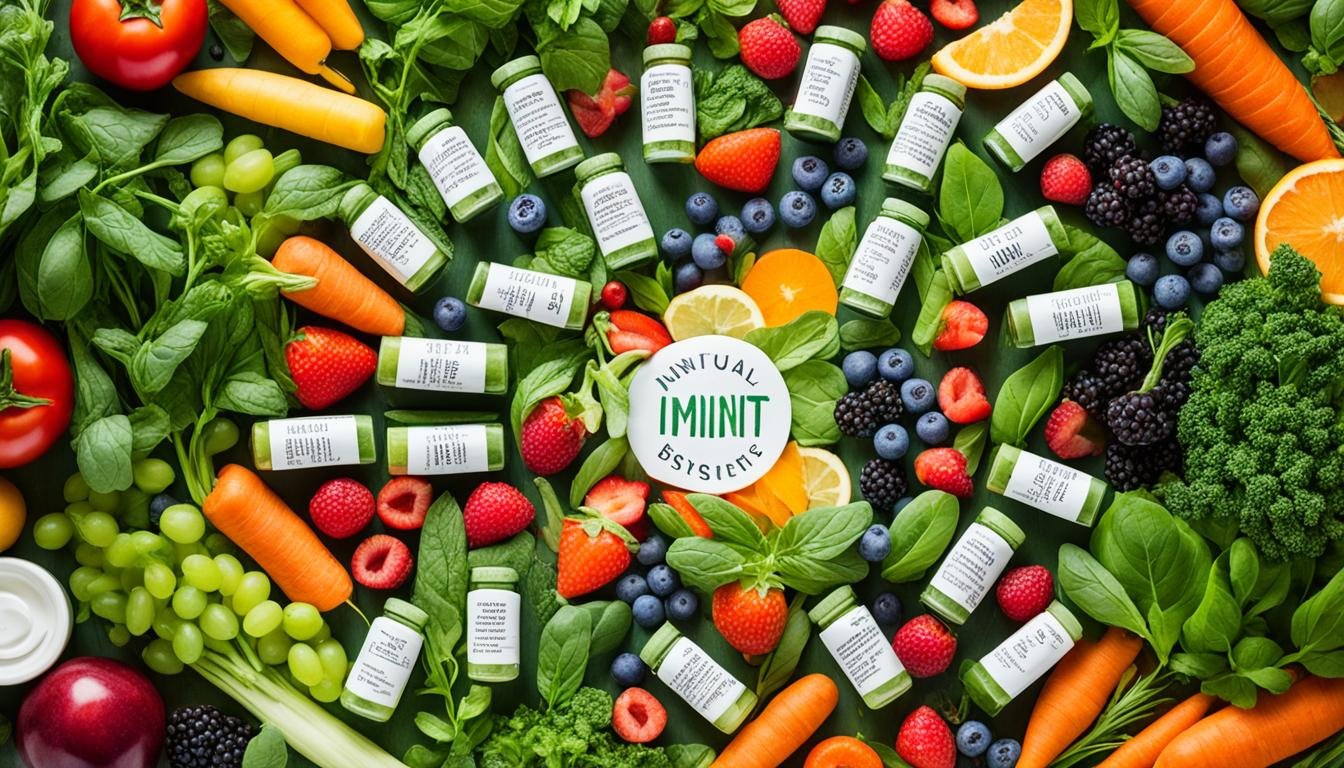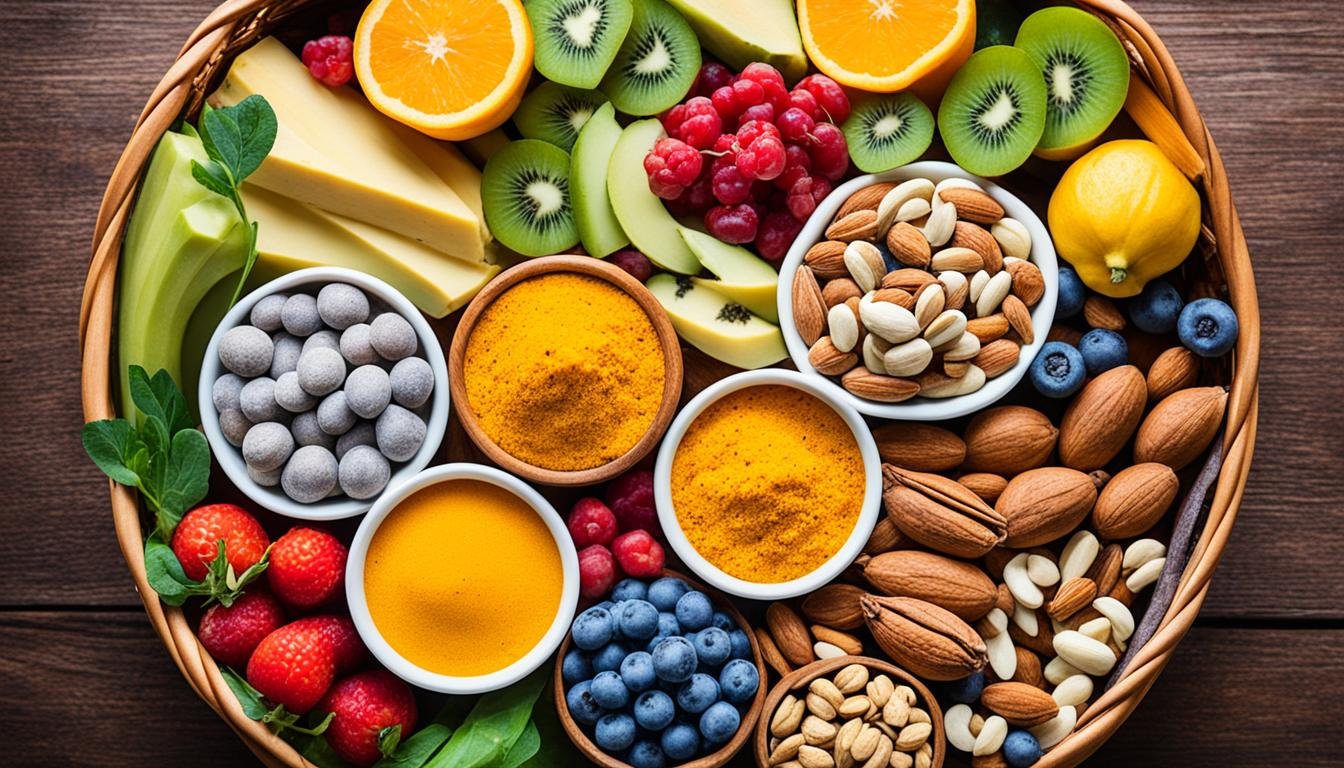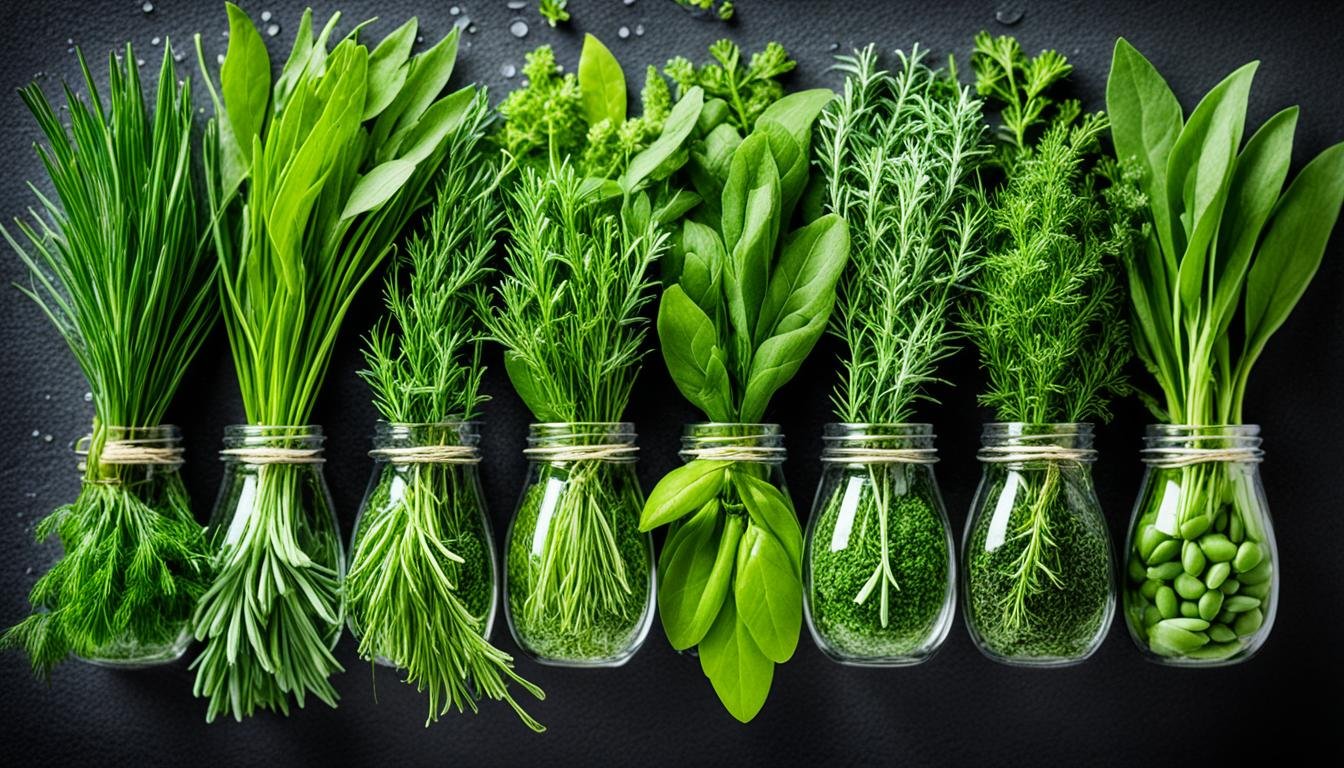Boost Health with Natural Supplements for Insulin Resistance

Did you know about 88 million adults in the United States who might have insulin resistance? It’s a condition where the body’s cells don’t react well to insulin. This leads to higher blood sugar levels. Insulin resistance is a big player in causing type 2 diabetes, obesity, and other long-term health issues.
If you’re fighting insulin resistance, adding natural supplements to your plan can be a big help. They can aid your body against insulin resistance. This helps by making your body respond better to insulin and controlling blood sugar. Let’s look at the top natural supplements to boost your health.
Key Takeaways:
- Insulin resistance affects around 88 million adults in the United States.
- Natural supplements can be a valuable addition to insulin resistance management.
- These supplements support insulin sensitivity and blood sugar regulation.
- Discover the best natural supplements for insulin resistance in this article.
- Consult with healthcare professionals before starting any new supplement regimen.
What is Insulin Resistance?
Insulin resistance is a health condition that makes it hard for the body to control blood sugar. It happens when the body’s cells don’t react well to insulin. Insulin is the key that opens the cells to let in sugar from the blood.
The body might produce more insulin to make up for this resistance. Then, there’s too much insulin in the blood. This is called hyperinsulinemia.
This condition is serious. It not only affects blood sugar but also raises the risk of health issues like type 2 diabetes and heart problems.
Recognizing insulin resistance is crucial. Look for signs like feeling more hungry, going to the bathroom a lot, and being tired. Weight gain and trouble losing weight are also common symptoms. Other signs include high blood pressure and too much cholesterol.
It’s vital to deal with insulin resistance early. Doing so can prevent bigger health problems later on.
Image:
Causes of Insulin Resistance
Insulin resistance is a metabolic issue affected by many things. Knowing its causes helps to manage it well. Here are some main factors:
Lifestyle Choices
Bad lifestyle habits are big in causing this. Eating lots of processed stuff, sugary drinks, and bad fats can make you gain weight. This can lead to insulin resistance. Not moving enough and sitting a lot can also mean your body is less sensitive to insulin.
Genetics
Your genes might make you more likely to get insulin resistance. Some gene changes can mess with how your body handles blood sugar. But just because you have these genes doesn’t mean you’ll absolutely get insulin resistance. It just increases the chance.
Underlying Conditions
Some health issues might boost your chances of insulin resistance. For example, PCOS in women or problems like fatty liver disease and sleep apnea can also play a part.
Inflammation
Long-term, mild inflammation can mess with your insulin. People with insulin resistance often have higher levels of CRP, an inflammatory marker. Eating a lot of processed food, smoking, stress, and some diseases can make your body inflamed.
Hormonal Imbalances
Balanced hormones are crucial for how your body uses insulin. People with issues like Cushing’s syndrome or who are going through big hormonal changes (like in menopause or pregnancy) can face insulin resistance.
Medications
Some drugs can also lead to insulin resistance. The ones to watch out for include certain antipsychotics, corticosteroids, and beta-blockers. It’s smart to chat with your doctor about how your medications might affect your insulin.
Other Risk Factors
Turning older can also lower your insulin sensitivity. Having had gestational diabetes before, or having a family history of insulin resistance or type 2 diabetes, increases your risk too.
It’s key to know what causes insulin resistance for better management. Improving lifestyle and treating underlying health issues can help. This way, you can lower the risk for serious problems.
The Importance of Managing Insulin Resistance
It’s key to handle insulin resistance well to stay healthy and avoid big health issues. When the body’s cells don’t respond well to insulin, it raises blood sugar. This can lead to type 2 diabetes and other problems if not dealt with.
Not managing insulin resistance can lead to serious long-term health issues like:
- Increased risk of cardiovascular disease
- Higher chances of developing obesity and weight gain
- Elevated blood pressure levels
- Impaired hormonal balance
- Reduced energy levels and fatigue
Handling insulin resistance means making changes to your life, what you eat, staying active, and sometimes using natural supplements. Doing these things helps your body react better to insulin and keeps your blood sugar in check. This lowers the risk of more trouble from insulin resistance.
To show how important it is to manage insulin resistance, here’s what Dr. Sarah Johnson, an expert, has to say:
“Insulin resistance is a silent condition that can silently wreak havoc on your health. By actively managing insulin resistance, you can prevent the progression to type 2 diabetes and improve your overall well-being.”
Now, let’s look at what lifestyle changes can combat insulin resistance and boost health.
Lifestyle Changes to Combat Insulin Resistance
It’s super important to adjust your lifestyle to deal with insulin resistance. By taking on these changes, your body becomes better at using insulin. You also manage your blood sugar more effectively. Let’s look at some changes you can make:
1. Healthy Eating Habits
Eat a balanced diet full of natural foods like fruits, veggies, whole grains, lean meats, and good fats. Stay away from processed foods and sugary drinks. Choose foods that are complex, which don’t cause a quick rise in blood sugar.
2. Regular Physical Activity
Being active not only helps control your weight but also makes your body better at using insulin. Mix in cardio, strength training, and activities that make you flexible. Try to get 150 minutes of moderate exercise each week.
3. Stress Management Techniques
Too much stress can make insulin resistance worse. Manage stress with deep breathing, meditation, or yoga. Do things that make you happy. Taking care of yourself and finding ways to relax can help your body better use insulin.
4. Adequate Sleep
Getting enough sleep is crucial because poor sleep is linked to insulin problems. Aim for 7 to 9 hours of sleep every night. This helps your body’s insulin work better.
5. Weight Management
Keeping a healthy weight is key for managing insulin resistance. Losing weight, even a little, can really help. Exercise and eating well are a great way to stay at a healthy weight.
Making these changes might not be easy, but they are really good for you. They help your body deal with insulin better and improve your health.

To tackle insulin resistance, focus on eating well, staying active, managing stress, getting enough sleep, and balancing your weight. Always check with your doctor before making big lifestyle changes or starting a new workout plan.
Role of Natural Supplements in Insulin Resistance Management
Natural supplements are key in managing insulin resistance. They boost your health and help regulate blood sugar. Adding these to your plan improves how your body uses insulin and glucose.
They particularly help your body respond better to insulin. This is called improving insulin sensitivity. It makes blood sugar control better and cuts down on risks from insulin resistance.
Many types of natural supplements show they can help with insulin resistance. They are usually full of vitamins, minerals, and special plant compounds. These help control your blood sugar.
Berberine is a favorite supplement for insulin resistance. It comes from plants like Oregon grape. Berberine can improve how your body uses insulin and lower blood sugar. It might even help with cholesterol and heart health.
Alpha-lipoic acid is another top choice. It’s a strong antioxidant that improves insulin sensitivity. It also lowers the inflammation from insulin resistance and could help with nerve problems in diabetes.
Fish oil, rich in omega-3, fights inflammation and boosts insulin sensitivity. Adding omega-3 to your diet can lower your resistance to insulin. This also cuts down on inflammation in metabolic disorders.
Cinnamon extract is becoming known for improving insulin. It acts like insulin and can better use of glucose. Using cinnamon might lower your blood sugar fast and make your body better at using insulin.
Although helpful, natural supplements are not a full solution. They can’t replace a healthy way of living or medical care. This is why you should always talk to a doctor before trying new supplements, especially if you have other health problems or take medicines.
Summary
Natural supplements are great for managing insulin resistance. They can better insulin use, control blood sugar, and lower risk of complications. But they’re part of a bigger plan. Before you try any, check with your doctor.
Best Natural Supplements for Insulin Resistance
Natural supplements are great for handling insulin resistance. They help your body manage blood sugar, making it more effective. Using the right supplements daily can boost your insulin sensitivity and improve your health. Here’s a list of top supplements for insulin resistance:
1. Chromium Picolinate
Chromium picolinate is a mineral that boosts how well insulin works, helping metabolism. It moves sugar from the blood into cells, fighting insulin resistance. Taking it regularly can balance blood sugar for those with insulin issues.
2. Berberine
Berberine is found in plants like barberries and has a long history in Chinese medicine. It gets insulin working better by affecting a key enzyme, AMPK. This helps manage blood sugar levels by making insulin more effective.
3. Alpha-Lipoic Acid
Alpha-lipoic acid is a strong antioxidant that battles the effects of insulin resistance like inflammation and stress. It makes cells more receptive to insulin and improves sugar uptake. It also guards against diabetes’ nerve damage.
4. Magnesium
Magnesium is crucial for insulin and is missing in insulin resistance. Making sure you have enough can enhance insulin use. This lowers your risk of metabolic problems like insulin resistance and diabetes.
5. Cinnamon
Cinnamon isn’t just a tasty spice; it’s a rich source of antioxidants and can fight inflammation. It helps insulin work better, improves sugar metabolism, and makes blood sugar levels better. Adding it to your meals or as a supplement can help manage insulin resistance.
Adding these supplements to your diet can aid in battling insulin resistance and managing your blood sugar. Before you start taking them, make sure to get advice from a healthcare provider. This ensures they’re right for you and your health.
| Supplement | Benefits | Recommended Dosage |
|---|---|---|
| Chromium Picolinate | Enhances insulin sensitivity Improves glucose metabolism |
200-1,000 mcg per day |
| Berberine | Activates AMPK enzyme Enhances insulin sensitivity |
500-1,500 mg per day |
| Alpha-Lipoic Acid | Reduces oxidative stress and inflammation Improves insulin sensitivity |
300-1,200 mg per day |
| Magnesium | Participates in insulin signaling Improves insulin sensitivity |
200-400 mg per day |
| Cinnamon | Improves insulin sensitivity Enhances glucose metabolism |
1-6 grams per day |
Herbal Supplements for Insulin Resistance
Some herbs can help with insulin resistance. They support better health by making the body more sensitive to insulin. They also help keep blood sugar at healthy levels and lower risks of complications.
Gymnema Sylvestre is one such herb. It can lower blood sugar by boosting insulin and making the body react better to it. Cinnamon works in a similar way. It may lower blood sugar and improve how the body uses glucose.
Bitter Melon and Fenugreek are also valuable. They help the body manage blood sugar. Bitter Melon acts like insulin, while Fenugreek makes the body respond better to insulin.
Using these herbs may be good for managing insulin resistance. But, they might not work for everyone. Before adding them to your routine, talk to a doctor. This is especially important if you’re on medication or have other health issues.
Always talk to a doctor before adding new herbs to your routine.
Herbal supplements are just one part of a plan to deal with insulin resistance. You should also eat well, exercise, and work on reducing stress. These steps are key to feeling your best and keeping your body working well.

| Herb | Mechanism of Action | Potential Side Effects |
|---|---|---|
| Gymnema Sylvestre | Increases insulin production and improves insulin sensitivity | May cause gastrointestinal discomfort |
| Cinnamon | Lowers fasting blood sugar levels and improves glucose metabolism | May interact with certain medications |
| Bitter Melon | Mimics the effects of insulin and regulates blood sugar levels | May cause stomach upset |
| Fenugreek | Enhances insulin sensitivity and lowers fasting blood sugar levels | May cause gastrointestinal discomfort |
Organic Remedies for Insulin Resistance
Dealing with insulin resistance? Organic remedies can bring big benefits to your health plan. They use natural items and foods to boost how well insulin works. This supports your health in many ways.
Unlike some medicines, organic options are gentle and don’t often cause bad side effects. They make it easier for your body to keep blood sugar in check.
Powerful Organic Ingredients
Certain organic items stand out for improving how sensitive your body is to insulin. These can be a simple part of your diet:
- Apple cider vinegar: It’s said to help lower blood sugar after eating when had before meals.
- Cinnamon: This tasty spice can make your body respond better to insulin and manage sugar.
- Fenugreek: Its seeds are known to help control sugar levels due to their anti-diabetic traits.
- Berberine: Improves how well insulin works and fights off insulin resistance, found in different plants.
Adding these items to meals can aid your body’s handling of insulin. This is key for good metabolic health.
Organic Foods for Insulin Sensitivity
Some organic foods help improve how insulin works in your body. Try to eat more of these:
- Leafy greens: Spinach, kale, and collards are full of nutrients that support good insulin function.
- Omega-3 rich fatty fish: The likes of salmon and sardines are great for better insulin sensitivity.
- Avocados: With healthy fats and fiber, they boost how your body reacts to insulin.
- Nuts and seeds: Choices like almonds and chia seeds are rich in things that help with insulin.
Regularly eating these organic foods can improve how your body uses insulin.
“Incorporating organic remedies can provide a natural and holistic approach to managing insulin resistance.” – Dr. Emily Roberts, Naturopathic Physician
Before you change your diet or try new organic methods, talk with a health pro. They can guide you based on what your body needs and your health goals.
Holistic Approaches to Insulin Resistance Management
Taking a whole-body approach is key in managing insulin resistance. This means looking at the mind, body, and spirit together. Using holistic remedies in your daily life can help you feel better while also dealing with the root causes of insulin resistance. Some practices have been particularly helpful.
Meditation
Meditation is great for lowering stress and finding peace. It helps your body naturally manage insulin levels better and become more sensitive to it. Spend a few minutes each day focusing on your breath to feel calmer and more aware.
Acupuncture
Acupuncture is an ancient Chinese method that places thin needles in key body points. This process improves your body’s energy flow and works to balance insulin. It’s been found to boost insulin sensitivity and cut down on inflammation, which is good for fighting insulin resistance.
Yoga
Yoga is a mix of poses, breathing exercises, and mental focus. It’s great for reducing stress, managing weight, and supporting better insulin reaction. Doing yoga regularly, either in a class or at home, can significantly help you control glucose better.
Choosing holistic methods can actively aid in your insulin resistance. Always talk to your doctor before adding new practices, especially if you have other health issues.
Effective Supplements for Insulin Resistance
Managing insulin resistance is key for your health. Some supplements can make a big difference. They are recommended by experts for better insulin sensitivity and blood sugar balance. Adding these to your daily plan will help you manage insulin resistance well and live healthier. Top supplements for insulin resistance include:
1. Alpha-Lipoic Acid
Alpha-Lipoic Acid (ALA) is a strong antioxidant. It improves how insulin works and cuts down on stress in the body. This supplement lowers blood sugar and lessens inflammation. You can find ALA in pill form as a supplement.
2. Chromium
Chromium is a key mineral for insulin to work right. It boosts how well your body uses insulin and helps keep blood sugar in check. People with insulin resistance can benefit from taking chromium. It comes in forms like chromium picolinate.
3. Cinnamon
Cinnamon is more than a tasty spice; it’s great for insulin resistance. It can lower blood sugar, improve how insulin works, and cut down on inflammation. Using cinnamon in your food or taking it as a supplement is a good idea.
4. Berberine
Berberine comes from different plants and shows promise for insulin resistance. It activates AMPK, an enzyme that boosts insulin sensitivity and glucose metabolism. Berberine supplements are easy to find and can really help manage insulin resistance.
5. Omega-3 Fatty Acids
Omega-3 fatty acids, especially EPA and DHA, help fight insulin resistance and make insulin work better. You’ll find these healthy fats in fish like salmon and mackerel. If fish isn’t a big part of your diet, omega-3 supplements are a good alternative.
| Supplement | Potential Benefits | Dosage |
|---|---|---|
| Alpha-Lipoic Acid | Improves insulin sensitivity, reduces oxidative stress | 600-1,800 mg per day |
| Chromium | Enhances insulin function, regulates blood sugar levels | 200-1,000 mcg per day |
| Cinnamon | Lowers blood sugar levels, improves insulin sensitivity | 1-6 grams per day |
| Berberine | Activates AMPK enzyme, improves insulin sensitivity | 500-1,500 mg per day |
| Omega-3 Fatty Acids | Reduces insulin resistance, improves insulin sensitivity | 1-3 grams per day |
Remember, always talk to your doctor before using supplements. They may give different advice depending on your health. Also, a healthy diet and exercise boost the benefits of these supplements for managing insulin resistance.
Choosing the right supplements for your plan can help improve how sensitive to insulin you are. This leads to a healthier life overall.
Conclusion
Insulin resistance is complex and can affect your health. We’ve talked about what it means and how it messes with your blood sugar. We also looked into why it happens and the big problems it can cause.
Using natural supplements is one way to deal with insulin resistance. They can make your body more sensitive to insulin and help keep your blood sugar steady. But, remember, they don’t replace advice from your doctor.
Always talk to a healthcare professional before you start any supplements. They can check if the supplements are right for you. Mixing lifestyle changes, natural supplements, and doctor’s advice is the best way to tackle insulin resistance and get healthier.
FAQ
What are natural supplements for insulin resistance?
Natural supplements for insulin resistance include vitamins, minerals, and herbs. They support the body to use insulin better. This helps regulate blood sugar levels and improve metabolic health.
Are natural supplements effective in managing insulin resistance?
Natural supplements can help manage insulin resistance. They are not a replacement for a healthy life or medical care. However, they can improve how insulin works and lower resistance as part of a full plan.
What are the best supplements for insulin resistance?
The best supplements vary by person. Common choices are berberine, chromium, and alpha-lipoic acid. Also, cinnamon, magnesium, and vitamin D are well-studied for managing insulin resistance.
Can herbs help in managing insulin resistance?
Yes, certain herbs can aid with insulin resistance. Berberine, cinnamon, and others improve blood sugar and insulin sensitivity. But, always check with a doctor before using herbs for insulin management.
Are there any organic remedies for insulin resistance?
Organic remedies can help manage insulin resistance. Eating foods that keep blood sugar steady, like leafy greens, can be beneficial. Also, drinking organic herbal teas, such as green tea, supports blood sugar control.
What are holistic remedies for insulin resistance?
Holistic treatments consider many factors, like reducing stress and staying active. They also include mindfulness practices like yoga. These methods aim to improve overall health and balance.
Which supplements are considered the most effective for insulin resistance?
Berberine, chromium, and cinnamon are often suggested for managing insulin resistance. Consulting a healthcare professional is a must before trying new supplements. This ensures a safe and effective plan.





